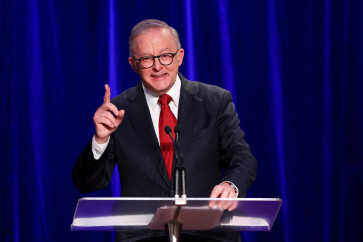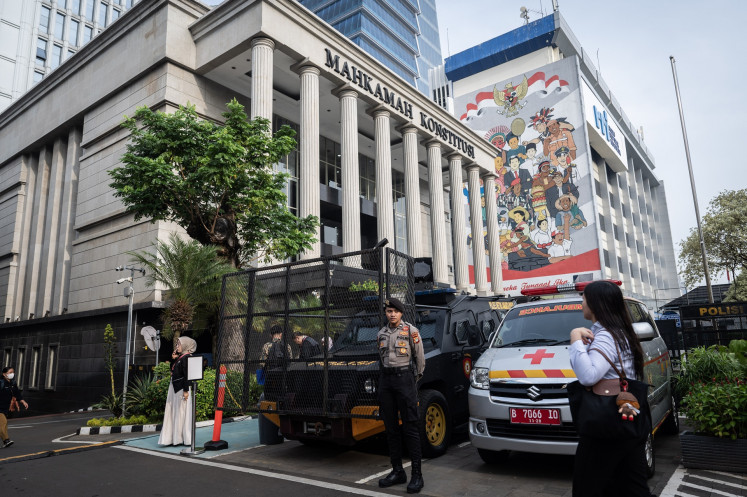RI-Australia: Time to be forthright, map out a better future
Indonesia-Australia relations have been damaged by a series of incidents, from the issue of asylum seekers to a spying furor
Change text size
Gift Premium Articles
to Anyone

I
ndonesia-Australia relations have been damaged by a series of incidents, from the issue of asylum seekers to a spying furor. Questions have been raised on how the once-close relationship between the two neighbors can be restored.
Australian and Indonesian experts attribute the current tension to a multitude of reasons, ranging from ignorance and misinformation to hard-line stances by politicians on both sides.
'Most nations are sensitive to issues of territory and sovereignty. At present, there are clearly important matters of friction arising from perceived intrusions into territory, seen as impinging on sovereignty, in both Australia and Indonesia,' said Peter McCawley, an Australian economist and expert on Indonesia.
Australia is sensitive to asylum seekers trying to enter by boat, but some believe that too much is expected from Jakarta. Nevertheless, Australians are used to a certain amount of peace and quiet, and cooperation on the issue is the only way forward.
'They [Australians] are startled and alarmed when refugees from strange countries in Asia and Africa start turning up, uninvited, on the northern shores of Australia. They want somebody to blame, and when they look north they see Indonesia, so they blame Indonesia for the strange things that are happening,' he added.
Indonesia in turn is sensitive to intrusions of sovereignty by Australian boats. Australian Prime Minister Tony Abbott has given good assurances to Indonesia over sovereignty. 'These assurances need to be strictly respected,' McCawley said.
Dewi Fortuna Anwar, advisor to Vice President Boediono, acknowledged that as close neighbors, the two countries would occasionally have problems; just like in families when members hold different opinions.
'However, as long as the basic trust and understanding are not violated [the relationship will be OK]. But if a husband cheats on his wife or vice versa, usually that breaks the trust. The recent revelation about the wire tapping, not only of the President [Susilo Bambang Yudhoyono's] phone but also his wife's, is like a husband cheating on his wife. It goes to the very essence of trust,' she said.
For Novianto Setiawan a student at Atma Jaya University in Jakarta, Indonesia-Australia relations have become a popular story after the spying row. 'The Australian government has done something outside the code of ethics,' he said.
Former Australian Young Liberal president Gideon Rozner argued that President Yudhoyono was perhaps being a touch delicate over the issue and taking it personally rather than appreciating what Abbott believed was necessary for Australia's security. 'Tony Abbott's approach to the espionage allegations was measured, effective and appropriate.'
Untidy, public pronouncements by Abbott have ignored the concept of 'losing face' and the solution may be a simple apology. Abbott's stubbornness, however, demonstrates that domestic politics are his priority. But this can also be said for Indonesia, which tends to not pay much attention to its southern neighbors.
'I think Australia considers Indonesia of more strategic importance than the way in which Indonesia views Australia. Indonesia is in the middle of a regional geopolitical reality where there are so many significant neighbors, and as Indonesia's attention tends to go north, so does Australia's,' Dewi said.
She noted that a lack of government-to-government and people-to-people understanding was a big part of the problem. 'Despite incessant media and diplomatic attention toward Indonesia in Australia, very few people have a hands-on knowledge of Indonesia,' Dewi said.
She suggested that Indonesia and Australia were just too different. 'Australia tends to look at its surrounding environment with the eyes of a stranger. Although it is physically in Asia, for a long time ' emotionally speaking ' Australia has been in Europe. It used to view its neighbors with fear and suspicion, and sometimes there is a superiority complex ['¦] which, of course, is not welcome,' she said.
Natalie Sambhi, analyst at the Australian Strategic Policy Institute, suggested that Indonesians believed Australia still threw its weight around like a colonial power. 'There is a sense that Australia is insensitive to Indonesia's domestic challenges and diplomatic grievances,' she said. Whether factually correct or not, the Australian government needed to be aware of this in order to prevent future criticism, she added.
Despite misperceptions on both sides, experts see relations between neighboring countries as important, even if the countries themselves are not necessarily strategically or economically important.
The window for repairing Indonesia-Australia relations is a mere eight months away, when Indonesia will welcome a new government. Whatever the solution proves to be, there may be a time limit on fixing past grievances. '[Indonesia's] current President is a leader who has maintained the friendliest attitude toward the West. We don't know who will be president in Indonesia later this year, but there is a possibility that it won't be someone so open to the West and so understanding of Australia,' Dewi said.
'None of the candidates are as comfortable in a global setting as Yudhoyono. Most are much more nationalistic and less globally oriented,' she said.
All agree, however, that it is time for Indonesia and Australia to be forthright with each other; to independently determine the importance of a bilateral relationship and work together to map out a future.
Evi Fitriani from the Univeristy of Indonesia's (UI) department of international relations said the focus needed to shift to society. 'We need to change society's views. There is a lack of understanding on both sides,' she said.
The first step toward creating a solid partnership, she said, was for the government and the media to change the tone of the conversation. The current excitable tone is detrimental to the promotion of the two countries as partners and not enemies. 'They need to calm down. They need to refrain from making harsh statements that only make the situation worse,' Fitriani said.
__________________
The writer is an intern at The Jakarta Post.









